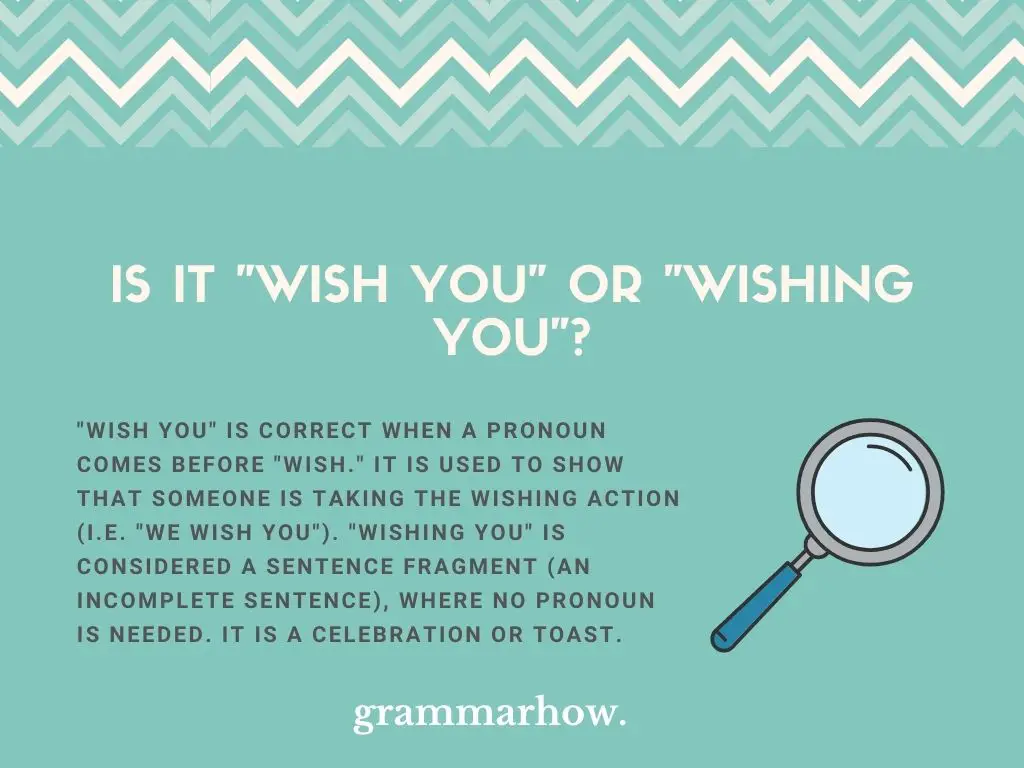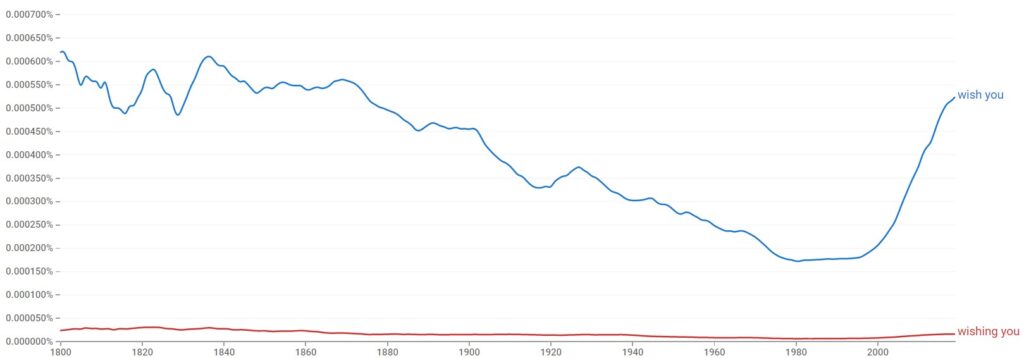Verb tenses can change based on the way we phrase our sentences. This article will demonstrate the differences between using “wish you” and “wishing you.” By the end of this, you should have a much better grasp of the two forms.
Is It “Wish You” or “Wishing You”?
“Wish you” is correct when a pronoun comes before “wish.” It is used to show that someone is taking the wishing action (i.e. “we wish you”). “Wishing you” is considered a sentence fragment (an incomplete sentence), where no pronoun is needed. It is a celebration or toast.

The phrases both mean the same thing. They are interchangeable, and the only difference comes from the tone or the person delivering the message.
For example, you might say:
- We wish you a Merry Christmas!
- Wishing you a Merry Christmas!
The first example is a simple phrase showing that “we” are completing the action of “wishing.”
The second example is a fragmented sentence. Formally, it is incomplete, but it is still recognizable as a sentence. Native speakers will understand that there does not need to be a specific pronoun here. The assumption is that a group is collectively wishing them “Merry Christmas.”
Wish You
“Wish you” is a simple verb form. It is used after a pronoun as an action to show that you (or someone else) are directing a wish toward another person. It is usually a kind thing that you are hoping somebody might be able to get out of their life.
- I wish you all the best, and I hope you stay in touch! I don’t know what I’m going to do without you around.
- I wish you all the happiness in the world. It’s going to be such a shame to come into work tomorrow and not see you here.
- We wish you the most fun day! We hope it’s everything that you expected from it! Let us know how it goes.
- I wish you will get better soon! Work simply isn’t the same without you sitting in the chair across from me.
- She wishes you all the best, but she said she couldn’t bear the thought of coming along to see you off.
- We wish you a Merry Christmas! We wish you a Merry Christmas! We wish you a Merry Christmas and a Happy New Year.
- They wish you well, but that’s about all you’ll get from them. They’re not the most friendly of people.
Wishing You
“Wishing you” is an incomplete sentence that is recognized as a fragment. The idea is to take “here’s to wishing you” as implied, even though “here’s to” is removed from the message. “Wishing you” is a more formal way of introducing a celebration or toast.
- Wishing you all the best in your new venture. Hopefully, it’s everything you ever imagined it would be.
- Wishing you the happiest of times. Enjoy yourself, and be sure to send a postcard.
- Wishing you good health and fortune. It’s time that you finally get a chance to enjoy yourself.
- Wishing you all the best. An opportunity like this couldn’t have happened to a nicer guy.
- Here’s to wishing you get what you want! I hope it’s all it was made out to be.
- Wishing you the very best! Let me know how everything plays out.
- Wishing you were here right now. I can’t do this on my own!
Which Is Used The Most?
According to Google Ngram Viewer, “wish you” is by far the most popular choice of the two. That’s because “wish” is the basic verb form that is most commonly found in all contexts.

“Wishing you” requires a bit more specificity before it is correct in certain contexts. That’s why it’s not nearly as common of a pick as “wish you.”
Is It “Wish You All The Best” or “Wishing You All The Best”?
“Wish you all the best” is correct when it comes after a pronoun. You should include something like “I” or “we” to show that you care about the person. “Wishing you all the best” works to sign off an email or holiday card to show that you’re thinking about someone.
- I wish you all the best, and I hope I get to hear from you again soon.
- Wishing you all the best. You’ll do great in your new company.
Is It “Wish You A Happy Birthday” or “Wishing You A Happy Birthday”?
“Wish you a happy birthday” is a personal way of showing that you’ve remembered someone’s birthday. It should come directly after a pronoun. “Wishing you a happy birthday” is more general, and it is often not used because it sounds forced when a personal pronoun is not used.
- I wish you a happy birthday! I hope you have a great time.
- Wishing you a happy birthday. Let us know when you’ll be back to work.
Is It “Wish You The Same” or “Wishing You The Same”?
“Wish you the same” is correct after a pronoun. It is a common phrase used to return the same wish that somebody might have already sent you back to them. “Wishing you the same” is correct as a sentence fragment as a sign-off in an email or letter.
- I wish you the same, of course. I hope you’re all good.
- Wishing you the same. Let me know when you’re back.
Is It “Wish You A Happy New Year” or “Wishing You A Happy New Year”?
“Wish you a Happy New Year” is correct when you or your family write to people you care about. Make sure you include your pronouns beforehand to be correct. “Wishing you a Happy New Year” is more suitable as a generic closer to an email rather than a personal message.
- I wish you a Happy New Year! I hope this one’s better for you.
- Wishing you a Happy New Year. See you later.
Is It “Wish You A Merry Christmas” or “Wishing You A Merry Christmas”?
“Wish you a Merry Christmas” should always come after you have included a pronoun. Whether you wish someone alone or as part of a group doesn’t matter, as long as a pronoun is used. “Wishing you a Merry Christmas” is more impersonal, and it only works formally.
- We wish you a Merry Christmas! Have a great time.
- Wishing you a Merry Christmas. See you after the holidays.
You may also like: Wish or Wishes – Which is Correct? (Helpful Examples)

Martin holds a Master’s degree in Finance and International Business. He has six years of experience in professional communication with clients, executives, and colleagues. Furthermore, he has teaching experience from Aarhus University. Martin has been featured as an expert in communication and teaching on Forbes and Shopify. Read more about Martin here.
